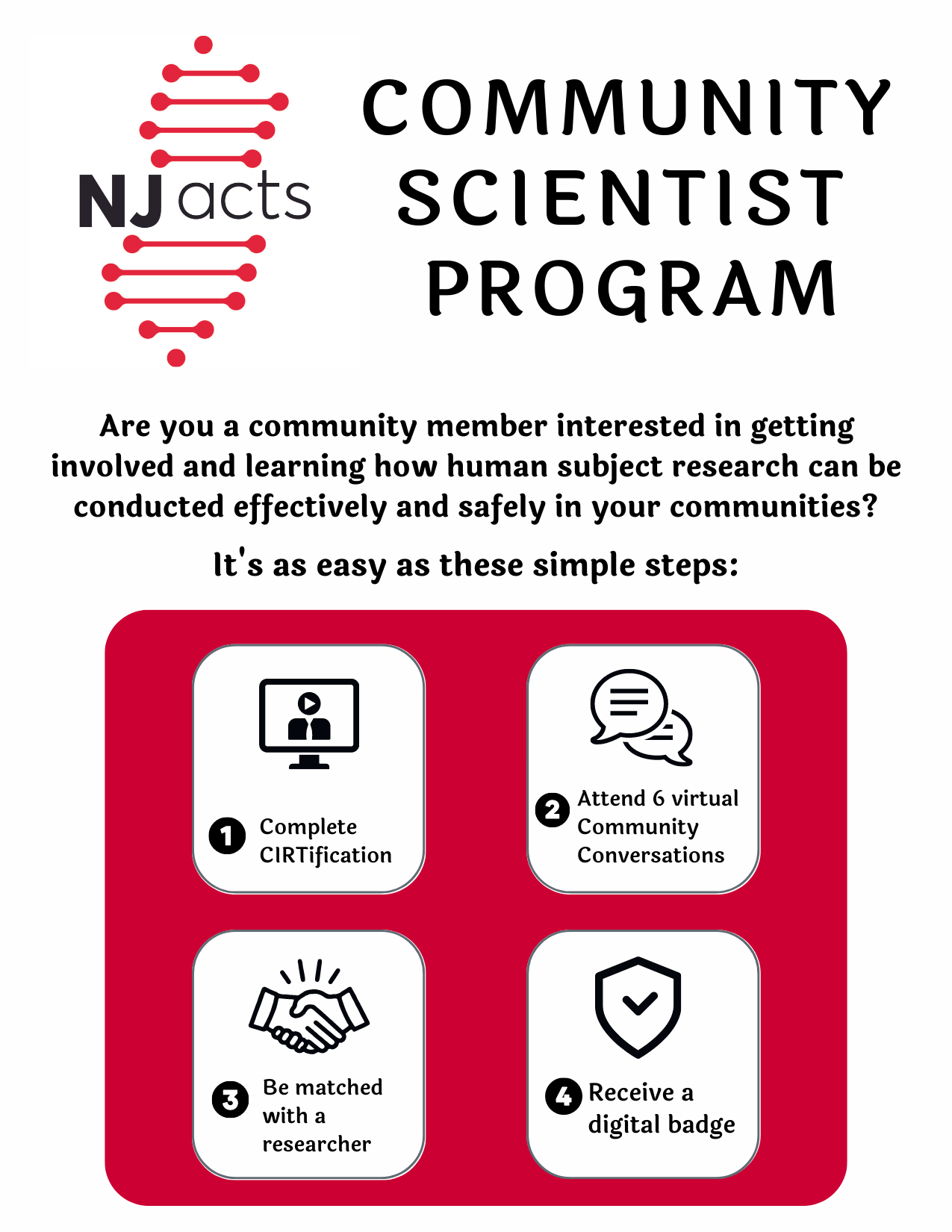180+ networks across 21 NJ counties
COMMUNITY ENGAGEMENT CORE OVERVIEW
NJACTS draws leading academic, industry and community groups together to understand and address the health needs of New Jersey. Central to this is engagement with our community to ensure that our efforts respond to their priorities. Our goal is to conduct research with the New Jersey community, in the community and for the community, and yet, have impact beyond our state’s boundaries.
Stay in Touch!
Join RCommunity!
Join Rutgers Health Service Corps!
Empowering Community-Based Research
Through Cultural and Linguistic Collaboration
- Navigating interpreter-mediated encounters
- Effective translation for research
- Understanding cultural nuances in literacy, trust, and belonging
Through collaboration across disciplines and leveraging expertise within and beyond Rutgers, CrEER ensures that research is inclusive, culturally relevant, and impactful both locally and globally.
👉 Discover how CrEER is shaping the future of community-based research here.
Association for Clinical and Translational Science (ATCS) Membership for Community Members
Did you know that community members are eligible to become members of ACTS through their affiliation with NJ ACTS?
Community members are able to access ACTS’ member benefits, including:
- Discounted registration to the annual Translational Science meeting
- Opportunities to participate in Special Interest Groups and Committees
- Access to the community platform website and more!
Resource for Investigators – CTSA Compendium of D&I Catalogs
Dissemination and implementation (D&I) research focuses on translating evidence-based interventions into real-world settings to improve health outcomes in the broader community.
An open-source CTSA Compendium of D&I Catalogs has been developed by the Clinical & Translational Science Awards (CTSA) Program’s “Advancing Dissemination and Implementation Sciences in CTSAs” working group to support investigators at any stage of their D&I skill-building journey. It provides a curated list of resource catalogs relevant to the conduct of D&I science. The materials include frameworks/theories/models, methods/measures, funding resources, practice resources, training, and health equity resources. Click here to learn more.
CIRTification – A New Alternative to CITI for Community Partners
The rollout of CIRTification at Rutgers has begun. The CIRTification program provides research ethics training alternative for individuals in community organizations, with limited understanding of conducting human research and protecting potential research participants. This option provides training that focuses on establishing the skills in community partners to conduct human subject research effectively and safely in their communities.
To learn more about the program at Rutgers, please visit this link CIRTification.
NJ ACTS COMMUNITY SCIENTIST PROGRAM
This program is designed to provide researchers with rapid feedback from expert community members to ensure their research projects are culturally appropriate and relevant to the community.
PARTICIPATE IN OUR NEXT COHORT!
For more information, please contact njactscommunity@rwjms.rutgers.edu
NJ HEROES TOO
Through the ongoing New Jersey Healthcare Essential Worker Outreach and Education Study – Testing Overlooked Occupations (NJ HEROES TOO), we have gained a wealth of data on COVID-19’s effects, gleaned valuable learnings on attitudes toward testing and vaccines, and improved COVID-19 awareness in underserved communities.

Community Blog
A Rutgers Scientist Confronts the Assertive “Bouncer” of the Brain, Seeking Insights into Human Health.
If you can imagine your brain as an exclusive nightclub, then it’s the bouncer standing guard at the door that most intrigues Rutgers scientist Natasha O’Brown. Her research explores the blood-brain barrier, a network of cells that regulates what can enter the brain—a...
Nicotine Pouches May Offer Path to Reduced Tobacco Harm.
As lawmakers and public health experts debate the safety of nicotine pouches, researchers from Rutgers Health found that for now, most adults that use these products also have a history of tobacco use and may be choosing these products as a possible step toward...
Soot’s Climate-Altering Properties Change Within Hours of Entering Atmosphere.
Billions upon billions of soot particles enter Earth’s atmosphere each second, totaling about 5.8 million metric tons a year — posing a climate-warming impact previously estimated at almost one-third that of carbon dioxide. Now, researchers say the climate-altering...
Rutgers and RWJBarnabas Health Receive $2.8 Million to Develop New Devices to Treat Epilepsy.
Researchers from Rutgers Health and other institutions were awarded a grant for $2.8 million over the course of three years from the National Institutes of Health to improve implantable devices for epileptic patients. The grant will fund a program to develop the next...

NJIT Researchers Develop Rapid Method to Detect Micro- and Nanoplastics in Seconds.
Microplastics and nanoplastics — tiny fragments shed from everyday plastic products — are increasingly found in our food, water, soil and even inside the human body. Their accumulation has been linked to fertility issues, metabolic disorders and other potential health...
Researchers Track How Iron Deficiency Disrupts Photosynthesis in Crucial Ocean Algae.
The next time you breathe, consider this: photosynthesis of algae, powered by iron dust in the ocean, made it possible. Now, a new Rutgers University study published in the Proceedings of the National Academy of Sciences pulls back the curtain on this vital process....



